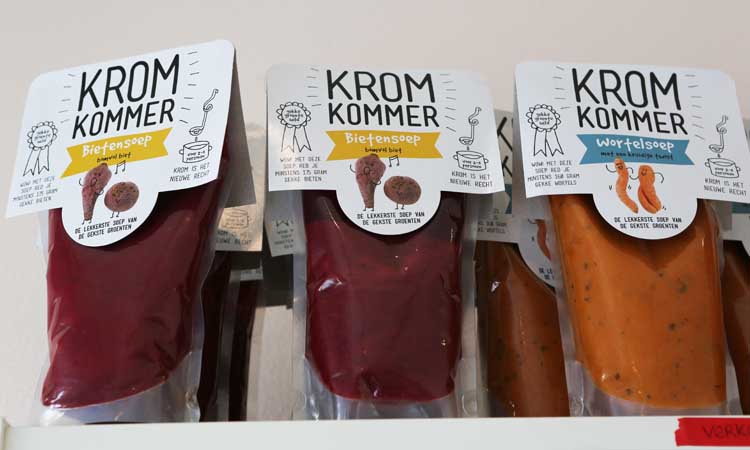Stuart Forster visits Kromkommer, a Dutch company reducing food waste by marketing products made with misshapen vegetables.
If you are in a shop or at a market and see a misshapen vegetable would you buy it or leave it, choosing in its place one that’s better looking? Many people select their vegetables primarily on looks, leading to food wastage.
Three Dutch women – Chantal Englenen, Jente de Vries and Lisanne van Zwol – have established the company Kromkommer, based in Rotterdam, to reduce food wastage and raise awareness of the issue. They met at university while undertaking research projects into food wastage.
Reducing food wastage
“About 30 to 50 per cent of all the food produced in the world is wasted,” says Chantal when we meet in Kromkommer’s head office, within Tropicana, a former tropical leisure pool complex by the banks of the New Meuse River in Rotterdam.
“Between five and ten per cent of vegetables are wasted because they don’t look good according to the standards we expect these days, such as double tomatoes and two-legged carrots. They never get to the supermarkets simply because we think they are not good enough. At Kromkommer we think these are good enough to be eaten,” she says with conviction.
Bridging supply and demand
“We have contact with growers who have these and surplus vegetables because sometimes demand is lower than production. That also leads to food waste. We have contact with growers and make products from these vegetables. We have beet soup, carrot soup and tomato soup,” says Chantal.
The soups retail at €3.79 and are produced cold – sugar-free and without additives – in a factory in the south of the Netherlands. 14,000 units were produced over the summer of 2014 and Kromkommer aims to increase that to 100,000 in 2015.
The packaging introduces the company’s philosophy. The name Kromkommer is a play on words. ‘Komkommer’ is the Dutch word for ‘cucumber’ and ‘krom’ means ‘bent’ or ‘twisted’.
“We hope to make a change in society and, in a few years, have these vegetables accepted as normal,” adds Jente.
A solution is possible
“We want to show the food chain that a different approach is possible,” explains Lisanne. “We’re not pointing fingers at supermarkets or other food chain partners. With good products and a positive approach we hope to inspire people to think differently about what they eat and what they do.”
In marketing their soups and helping to distribute misshapen fruit and vegetables they may well be on the way to achieving that.
Further information
Find out more about the company’s philosophy on the Kromkommer website.
Photos illustrating this post are by Why Eye Photography.
Thanks for reading this article about Kromkommer, the Rotterdam-based company reducing food waste by using misshapen vegetables. Interested in ways of reducing your food waste? You may find this post about using coffee grinds to harvest oyster mushrooms interesting.
If you enjoyed this post why not sign up for the free Go Eat Do newsletter? It’s a hassle-free way of getting links to posts on a monthly basis.
‘Like’ the Go Eat Do Facebook page to see more photos and content.




